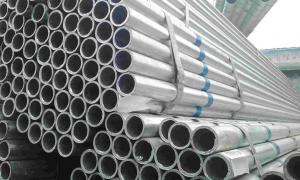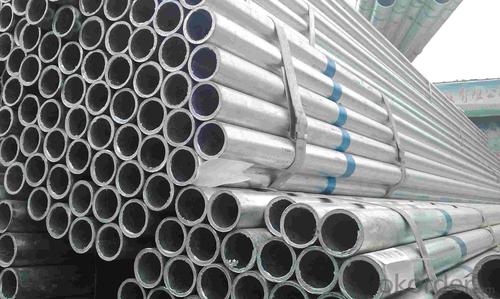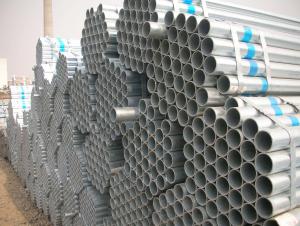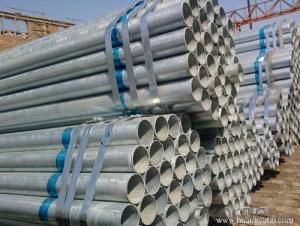Galvanized Pipe America-Standard ASTM A500 API 5L 100g/200g Hot Dipped Pipe
- Loading Port:
- Tianjin
- Payment Terms:
- TT or LC
- Min Order Qty:
- 50 m.t.
- Supply Capability:
- 7000 m.t./month
OKorder Service Pledge
OKorder Financial Service
You Might Also Like
1、Structure of Galvanized Pipe America-Standard ASTM A500 API 5L 100g/200g Hot Dipped Pipe:
The surface of Galvanized Pipe America-Standard ASTM A500 API 5L 100g/200g Hot Dipped Pipecan increase the corrosion resistance of the steel tube, prolong service life. Galvanized pipe is widely used, in addition to water, gas, oil and other general low pressure fluid pipelines. It is also used in the petroleum industry, especially for offshore oil field of oil well pipe and oil pipe, chemical, coking equipment of oil heater, condensation cooler, coal run oil exchanger tube, and trestle pile, the mine tunnel support frame tube.
2、Main Features of Galvanized Pipe America-Standard ASTM A500 API 5L 100g/200g Hot Dipped Pipe:
• High manufacturing accuracy with standard
• High strength and stable
• Good visual effect
• Reasonable price
• Small inertia resistance
• Strong heat dissipation ability
3、Galvanized Pipe America-Standard ASTM A500 API 5L 100g/200g Hot Dipped Pipe Specification:
Standard | GB, DIN, ASTM ASTM A106-2006, ASTM A53-2007 |
Grade | 10#-45#, 16Mn 10#, 20#, 45#, 16Mn |
Thickness | 1 - 33 mm |
Section Shape | Round |
Outer Diameter | 21 - 610mm |
Place of Origin | Tianjin, China (Mainland) |
Secondary Or Not | Non-secondary |
Application | Hydraulic Pipe |
Technique | Cold Drawn |
Certification | API |
Surface Treatment | factory state or painted black |
Special Pipe | API Pipe |
Alloy Or Not | Non-alloy |
Length | 5-12M |
Outer Diameter | 21.3-610mm |
Grade | 20#, 45#, Q345, API J55, API K55, API L80, API N80, API P110, A53B |
Standard | ASME, ASTM |
1) Material:20#(ASTM A 106/A53 GRB.API5LGRB,GB),45#,16Mn,10#.
2) Specification range:OD:21.3-610mm,WT:6-70mm,length:6-12m or according to the requirement of clients.
3) Excutive standards:GB,ASME API5L.ASTM A 106/A53,Despite of the above standards,we can also supply seamless steel pipe with standard of DIN,JIS,and so on,and also develop new products according to the requirements of our clients!
4) Surface:black lacquered,varnish coating or galvanized.
5) Ends:Beveled or square cut,plastic capped,painted.
6) Packing:bundles wrapped with strong steel strip,seaworthy packing.
4、Packaging & Delivery
Packaging Details: | seaworthy package,bundles wrapped with strong steel strip |
Delivery Detail: | 15-30days after received 30%TT |
5、FAQ of Galvanized Pipe America-Standard ASTM A500 API 5L 100g/200g Hot Dipped Pipe:
①How is the quality of your products?
Our products are manufactured strictly according to national and internaional standard, and we take a test
on every pipe before delivered out. If you want see our quality certifications and all kinds of testing report, please just ask us for it.
Guaranteed: If products’ quality don’t accord to discription as we give or the promise before you place order, we promise 100% refund.
②How about price?
Yes, we are factory and be able to give you lowest price below market one, and we have a policy that “ for saving time and absolutely honest business attitude, we quote as lowest as possible for any customer, and discount can be given according to quantity”,if you like bargain and factory price is not low enough as you think, just don’t waste your time.Please trust the quotation we would give you, it is professional one.
③Why should you chose us?
Chose happens because of quality, then price, We can give you both.Additionally, we can also offer professional products inquiry, products knowledge train(
6、 Galvanized Pipe America-Standard ASTM A500 API 5L 100g/200g Hot Dipped Pipe: Images:
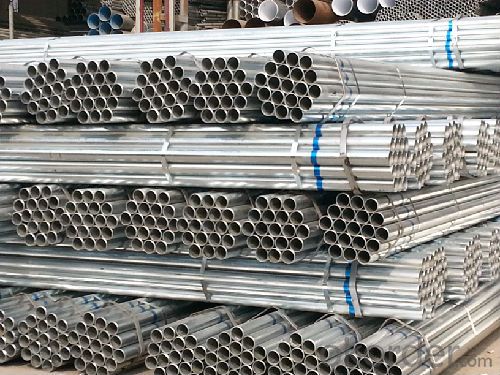
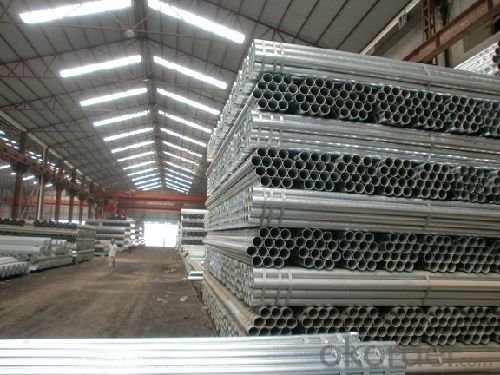
- Q: How are steel pipes threaded for easy installation?
- Steel pipes are threaded for easy installation using a process called threading. Threading involves cutting grooves or ridges into the pipe to create a spiral pattern. This pattern allows the pipe to easily connect with other threaded components, such as fittings or valves. There are two common methods used to thread steel pipes: manual threading and machine threading. In manual threading, a handheld tool called a pipe die is used. The die is equipped with sharp teeth that cut into the pipe as it is rotated. The pipe is secured in a vise or held firmly by hand, and the die is applied to the end of the pipe. The die is then rotated around the pipe, creating the threaded grooves. This process requires skill and precision to ensure accurate and properly aligned threads. Machine threading, on the other hand, is a more automated process. It involves the use of a pipe threading machine, which is equipped with a die head that automatically cuts the threads into the pipe. The machine secures the pipe and rotates it while the die head moves along the length of the pipe, cutting the threads. Machine threading is faster and more efficient than manual threading, making it ideal for large-scale production or projects. Regardless of the method used, it is crucial to ensure that the threads are clean and free from debris or burrs. This is important for easy installation and to prevent leaks or other complications. After threading, the pipes are typically inspected to ensure the threads meet the required specifications. Threading steel pipes allows for easy installation as the threaded ends can be easily screwed into fittings, valves, or other pipes with compatible threads. This threaded connection creates a tight seal, making it suitable for various applications, such as plumbing, gas lines, or industrial piping systems.
- Q: What is the maximum diameter of steel pipes?
- The maximum diameter of steel pipes can vary depending on various factors such as manufacturing capabilities, industry standards, and specific project requirements. However, steel pipes can typically range from a few millimeters in diameter for small-scale applications to several meters in diameter for large-scale industrial projects.
- Q: How are steel pipes used in the manufacturing of automobiles?
- Steel pipes are commonly used in the manufacturing of automobiles due to their strength, durability, and versatility. They are used in various applications throughout the automobile manufacturing process. One of the main uses of steel pipes in automobiles is for the construction of the vehicle's chassis and body. Steel pipes are often used as structural components to provide strength and rigidity to the vehicle. They can be bent, shaped, and welded to form the desired structure, making them an ideal choice for automotive applications. Steel pipes are also used in the exhaust system of automobiles. The exhaust system is responsible for guiding and directing the exhaust gases away from the engine. Steel pipes are used to create the exhaust manifold, which collects the gases from the engine's cylinders, as well as the exhaust pipes and mufflers. The high temperature resistance and corrosion resistance of steel make it suitable for withstanding the harsh conditions of the exhaust system. In addition, steel pipes are used in the cooling system of automobiles. They are used to transport coolant from the engine to the radiator and back, helping to regulate the engine's temperature. Steel pipes are preferred for this application due to their ability to handle high pressure and temperature, as well as their resistance to corrosion and chemical damage. Moreover, steel pipes are used in the fuel system of automobiles. They are used to transport fuel from the tank to the engine, ensuring a steady and reliable supply of fuel. Steel pipes are chosen for this application because they are resistant to corrosion and can handle the high pressure and temperature associated with fuel transportation. In summary, steel pipes are essential in the manufacturing of automobiles. They are used in the construction of the chassis and body, the exhaust system, the cooling system, and the fuel system. Their strength, durability, and versatility make them a preferred choice for automotive applications.
- Q: What are the different types of steel pipe supports for thermal expansion?
- There are several types of steel pipe supports for thermal expansion, including fixed supports, sliding supports, and variable spring supports. Fixed supports are rigid and do not allow for movement, while sliding supports allow for limited axial movement. Variable spring supports use mechanical springs to accommodate thermal expansion and contraction, providing continuous support while allowing for movement.
- Q: What are steel pipes used for?
- Steel pipes are commonly used for transporting fluids and gases, as well as for structural applications such as construction, oil and gas exploration, and plumbing systems.
- Q: Can steel pipes be used for underground drainage in acidic soils?
- Steel pipes can be used for underground drainage in acidic soils, but it is important to consider certain factors. Acidic soils can cause corrosion in steel pipes, leading to weakening and potential failure over time. To mitigate this risk, it is advisable to use galvanized steel pipes that are treated with a protective coating to resist corrosion. Additionally, regular inspection and maintenance should be carried out to identify and address any signs of corrosion or deterioration. It is also worth considering alternative materials such as PVC or HDPE pipes, which are more resistant to corrosion in acidic environments. Ultimately, the choice of material should be based on a thorough assessment of the soil conditions, the expected lifespan of the drainage system, and the budgetary constraints.
- Q: What are the different types of steel pipe bends?
- There are three main types of steel pipe bends: 90-degree bends, 45-degree bends, and 180-degree bends. These bends are commonly used in piping systems to redirect the flow of fluids or gases in a desired direction.
- Q: What are the different sizes available for steel pipes?
- Steel pipes are available in a wide range of sizes, ranging from small diameters as small as 1/8 inch to larger diameters exceeding 72 inches. The sizes of steel pipes are typically measured based on their outside diameter (OD) and wall thickness, with various standard sizes available to meet different application requirements.
- Q: Are steel pipes suitable for industrial applications?
- Yes, steel pipes are highly suitable for industrial applications. Steel pipes offer several advantages that make them the preferred choice for various industries. Firstly, steel pipes have excellent strength and durability, making them capable of withstanding high pressure and heavy loads. This makes them ideal for applications involving transportation of liquids, gases, and solids. Additionally, steel pipes have a high resistance to corrosion, which is crucial in industrial environments where exposure to harsh chemicals, moisture, and extreme temperatures is common. The corrosion-resistant properties of steel pipes ensure a longer lifespan and reduce the need for frequent maintenance and replacements. Moreover, steel pipes have a smooth interior surface, which minimizes friction and allows for efficient flow of materials. This is especially important for industries such as oil and gas, where the smooth flow of fluids is essential for proper operations. Furthermore, steel pipes are available in a wide range of sizes and thicknesses, allowing for customization and flexibility in design. They can be easily welded and connected, enabling easy installation and modification as per the specific requirements of industrial applications. Overall, steel pipes offer a combination of strength, durability, corrosion resistance, and versatility, making them highly suitable and widely used in various industrial applications such as oil and gas, construction, water treatment, power generation, and chemical processing.
- Q: How are steel pipes coated for underground applications?
- Steel pipes are typically coated for underground applications using a variety of methods, including but not limited to hot-dip galvanizing, epoxy coating, and polyethylene wrapping. These protective coatings help prevent corrosion, increase the lifespan of the pipes, and ensure their reliability in underground environments.
Send your message to us
Galvanized Pipe America-Standard ASTM A500 API 5L 100g/200g Hot Dipped Pipe
- Loading Port:
- Tianjin
- Payment Terms:
- TT or LC
- Min Order Qty:
- 50 m.t.
- Supply Capability:
- 7000 m.t./month
OKorder Service Pledge
OKorder Financial Service
Similar products
Hot products
Hot Searches
Related keywords
